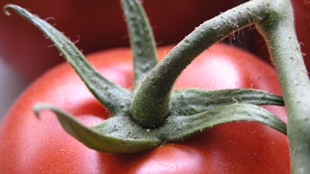 WIKIMEDIA COMMONS, GOLDLOCKI
WIKIMEDIA COMMONS, GOLDLOCKI
Researchers have compiled a profile of flavor and aromatic compounds that work together to make tomatoes tasty, reported Wired Science. As part of the ongoing effort to help breed supermarket-sturdy tomatoes with appealing flavor, scientists correlated consumer preference with expression patterns of compounds that contribute to tomato flavor and sweetness, and reported their findings in a study published online last week (May 24) in Current Biology.
“With something like a banana, you can identify one volatile compound that you smell and say, ‘Aha! It’s a banana!’ With a tomato, it’s not that simple,” co-author and plant molecular biologist Harry Klee, of the University of Florida, told Wired. “You can detect 400 volatile compounds in a tomato. People have speculated that maybe 20 are really important, ...


















